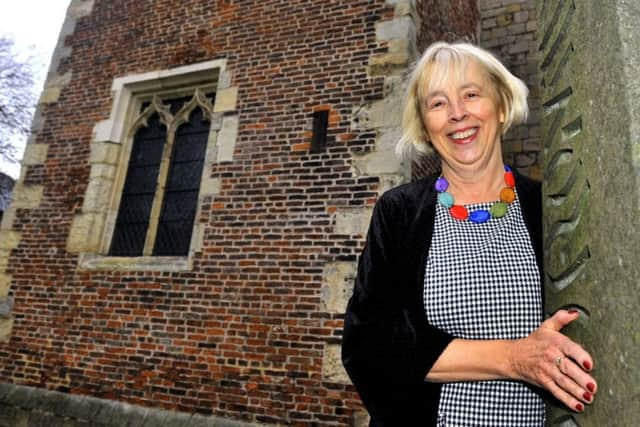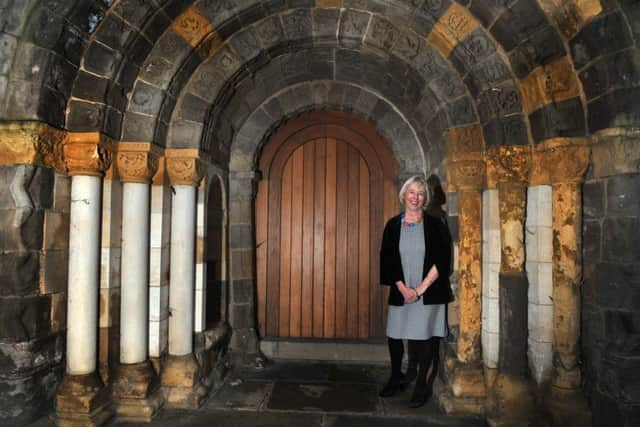Meet the woman helped turn unloved medieval church in York into hub of music
She is acknowledged as one of the most influential people in Yorkshire’s musical life. Admired as much for her skills and her erudition as for her kindness and charm. “She is absolutely the ‘go-to’ person in her field”, says a friend and colleague.
But, when asked if there was any musical background to her family, Delma Tomlin, the founding director and chief executive of the National Centre for Early Music (NCEM), based in the heart of York, reflects for a second, smiles, and says: “Well, my dad could whistle – and often did”. Then she adds: “There was always music in the house.”
Advertisement
Hide AdAdvertisement
Hide AdAlongside her desk today, in the offices of the NCEM in Walmgate, are sets of long shelves. One is a home for scores of CDs and the others are for books. One of those volumes is possibly the key to where Tomlin is today and the influence that she and her organisation have in the fabric of Britain’s music.


It was a prize, awarded when she was in her teens and still at school in her home city, Nottingham. She locates it with ease and opens it on the fly page. It is called Masterpiece of Music before 1750 and the authors are Carl Parrish and John F Ohl. There is her name, inscribed by one of her teachers.
“I haven’t a clue why they gave it to me and I honestly have no recollection of my asking for it as a prize-giving day award. But there it is and it has stayed with me ever since. It is, I think, the thing that opened the door for me into the amazing world of early music.”
Her school recognised her talent as a musician. She was judged good enough to go to Trinity College in London, the acclaimed school that supports the music education of thousands of students.
Advertisement
Hide AdAdvertisement
Hide AdHowever, once there she found – she says candidly – that she was out of her depth. “There were others who were far better musicians than I was ever going to be. But I persevered because the attitude back then was that ‘you got on with it or you went back home’. But I was never going to be up there on a concert platform or stage.”


After her four years she realised that arts administration was where her talents lay. “That was where I felt comfortable. Organising things. Getting things to happen. It helped that I’d also landed a job as a steward at the nearby Wigmore Hall in my spare time and was observing how things were put together and programmed”.
Her first professional job came in the choral department of a top musical management agency before she moved on to the music division of the famed Faber publishing house. Here she discovered a valuable lesson in that “they believed that if you make money, you spend it on putting it back into a good artistic programme. That comes first – not the shareholders.” This is part of the NCEM philosophy today.
Tomlin went on to become house manager at the (then) Gardiner Arts Centre, part of the new “plate-glass” University of Sussex. “It was a time when central government and local authorities were throwing money at further education and every new uni had to have an arts centre, a gallery, a theatre... you name it!” she says.
Advertisement
Hide AdAdvertisement
Hide AdAnd then came the call in the early 1980s that was to change her life. The organisers of the York Mystery Plays asked if she’d be interested in taking over as its administrator.
She agreed, moved north and fell in love with the city and has been here ever since. “It was a very different place back then,” she says, “but there were still all those beautiful historic places and what seemed to be dozens of churches. Every street in the centre seemed to have at least one – and often two or three of them.”
She was a key figure in developing the York Early Music Festival. She’d seen the potential in one of the city’s most beautiful buildings. Today, it is the home of the NCEM but back then St Margaret’s on Walmgate was in a sorry state and almost near to collapse. Although it was (and still is) Grade I listed, the decommissioned medieval place of worship was right at the top of the “at risk” register. It was cold and wet and had become a bit of a dumping ground. “A lot of people used the churchyard as a convenient spot to park their cars and that was the least of the problems,” says Tomlin.
They had two options as a new home. “We had for a site the De Grey Rooms, which were elegant and beautiful – but right next door to a main road and a lot of noise”. She knew it had to be St Margaret’s. After the place had been tidied up a musician was invited to play a piece scored for the lute. “The big question was how is it going to sound?” she says. “And I must admit, we all stood there with bated breath – but it was simply perfect. Everyone thought we were totally bonkers in taking the place on but we’ve proved them absolutely wrong”.
Advertisement
Hide AdAdvertisement
Hide AdToday the beautiful old church is a thriving building, warm and loved. The church is the performance space, a modern extension houses offices and a reception area. There are dozens of regular concerts and events and it’s right in the centre of the revitalised student quarter.
A lot of her many admirers would give a very enthusiastic round of applause if she were made a Dame some time soon. As one of them says: “She’s a total powerhouse. If Delma gets involved, it gets done. She’s a great listener, she’s a lot of fun and she puts in 100 per cent constantly.”
One of the things she has learned in that long career in and with the arts is to avoid open-air events. “That’s a purely personal observation. I wish anyone else who wants to organise one, or a series of them, the very best of luck. But they’ve never gone quite properly for me. I’ve learned to steer clear.
“Not just the British weather – that is always left to chance. You can plan something for what you fervently hope will be a glorious June day, in high summer, with hours of sunshine and it will, almost inevitably (at least for me) cloud over and bucket down with rain in stair-rods.”
Advertisement
Hide AdAdvertisement
Hide AdInstead it’s the added logistical complications that come with outdoor events. “And then there are always problems with the acoustics. Back in the very early days of my career I was involved with an event in St Katherine’s Dock in London.
“It’s a great place and looks spectacular but when it began no one could hear a thing. I was in the box office. I was besieged with people – quite rightly – asking for their money back. There were so many furious customers demanding refunds that the news made the front page of next day’s papers!”
Looking back, Tomlin says it’s really “very humbling” to be a tiny part of York’s rich history. “Was St Margaret’s lucky to find me? I was certainly lucky to find it.” And, when she has that rare event, an evening off, and some time of her own to relax in, what music will be heard in the background?
“Something peaceful, something calming. Vaughan Williams maybe or some Thomas Tallis. Choral music always does it for me.”
Years of concerts being planned
Advertisement
Hide AdAdvertisement
Hide AdTomlin’s schedule of concerts is also heard at York and Beverley minsters and she has an enviable relationship with the BBC, which often broadcast concerts and performers on Radio 3.
She is already planning concerts and events well into 2022 and there will be a major “continental arrangement” announced very soon – if all goes to plan. Her work has been recognised with several honours – not least an Honorary Doctorate from York University and an MBE for services to the arts and music.
Dates for your diary: Beverley and East Riding Early Music Festival, May 29 and 30. York Early Music Festival, July 5 to July 11. Tickets.ncem.co.uk or [email protected] and from St Margaret’s Church, Walmgate, York. Tel: 01904 658 338.